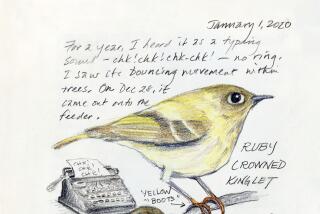Looking at ‘The O. Henry Prize Stories 2013’
Let’s not pull any punches: The very best thing about “The O. Henry Prize Stories 2013” is the inclusion of Deborah Eisenberg’s “Your Duck Is My Duck.” No disrespect to the other 19 contributors — who include Tash Aw, Donald Antrim, Jamie Quatro and Ann Beattie — but in my universe, there are few miracles as rare and beautiful as a story by Eisenberg.
She doesn’t publish much: 30 or so stories since her first collection, “Transactions in a Foreign Currency,” came out in 1986. It’s been seven years since her last book of new work, “Twilight of the Superheroes,” although “The Collected Stories of Deborah Eisenberg,” did win a 2011 PEN/Faulkner Award.
Still, there is nothing spare or scarce about her vision, which is expansive, global even, walking a line between politics and personality, tracing not just the inner life of her subjects but also, in a very real sense, their complicity. “Here you’re able to speak freely, within reason, of course,” a character observes of America in the desperate aftermath of Sept. 11, “and isn’t it wonderful that you all happen to want to say exactly what they want you to say?”
“Your Duck Is My Duck” operates out of a similar sensibility, although it’s fair to say, I think, that it has more in common with Eisenberg’s pre-“Twilight of the Superheroes” work. Like many stories in her first three collections, it takes place in Latin America, in an unnamed country that could be Mexico.
The set-up is simple: An artist at loose ends is invited by a wealthy couple to visit their south-of-the-border hacienda for a few months of work, or R ’n’ R. Once she arrives, she discovers that the situation is far more complicated -- ethically and emotionally -- than she had thought.
“Apparently, most of the people in the area had lived for centuries by working little farms,” Eisenberg writes. “But a few years earlier there had been relentless rain, and the flooding had washed out the crops, and then there was a second year of that. The third year was a drought, and so was the next one, so none of the new planting could establish roots, and it all blew away.”
In an attempt to rectify (or capitalize on) the problem, her hosts, Ray and Christa, begin to buy up all the farmland, planting eucalyptus “as a cash crop,” until it burns in lightning storms. “So naturally,” Eisenberg continues, “local people who could leave were leaving, and a lot of the foreigners, like Ray and Christa, who had places in the areas were pulling up stakes, too.”
This is what Eisenberg does so brilliantly, tracing not the law of unintended consequences so much as a matrix of responsibility that links us underneath the surface of the everyday. The paradise to which the artist has been invited does not exist; it’s not even a fantasy so much as a lie. Her presence implicates her in the corruption, and yet, what else is she supposed to do? “It’s odd — no matter how you feel about a place, it’s as though you exchange something with it,” she explains. “It keeps a little bit of you, and you keep a little bit of it.”
The same, of course, is true of Eisenberg’s writing, which unfolds in the tenuous middle territory between our inextricable connectedness and our desire (need?) to set ourselves apart.
“It was a different time here — must that not mean that different things were happening?” her narrator tells us. “I’d brought my computer, but maybe I could actually just not turn it on, and the dreary growth of little obligations that overran my screen would just disappear; maybe the news, which — like a magic substance in a fairy tale — was producing perpetually increasing awfulness from rock-bottom bad, would just disappear.”
ALSO:
A shark’s tale: Reading about great whites
JD Salinger: Glimpses of his hidden writing in new book
Finding lost Philip Roth in a Provincetown used bookstore
More to Read
Sign up for our Book Club newsletter
Get the latest news, events and more from the Los Angeles Times Book Club, and help us get L.A. reading and talking.
You may occasionally receive promotional content from the Los Angeles Times.









